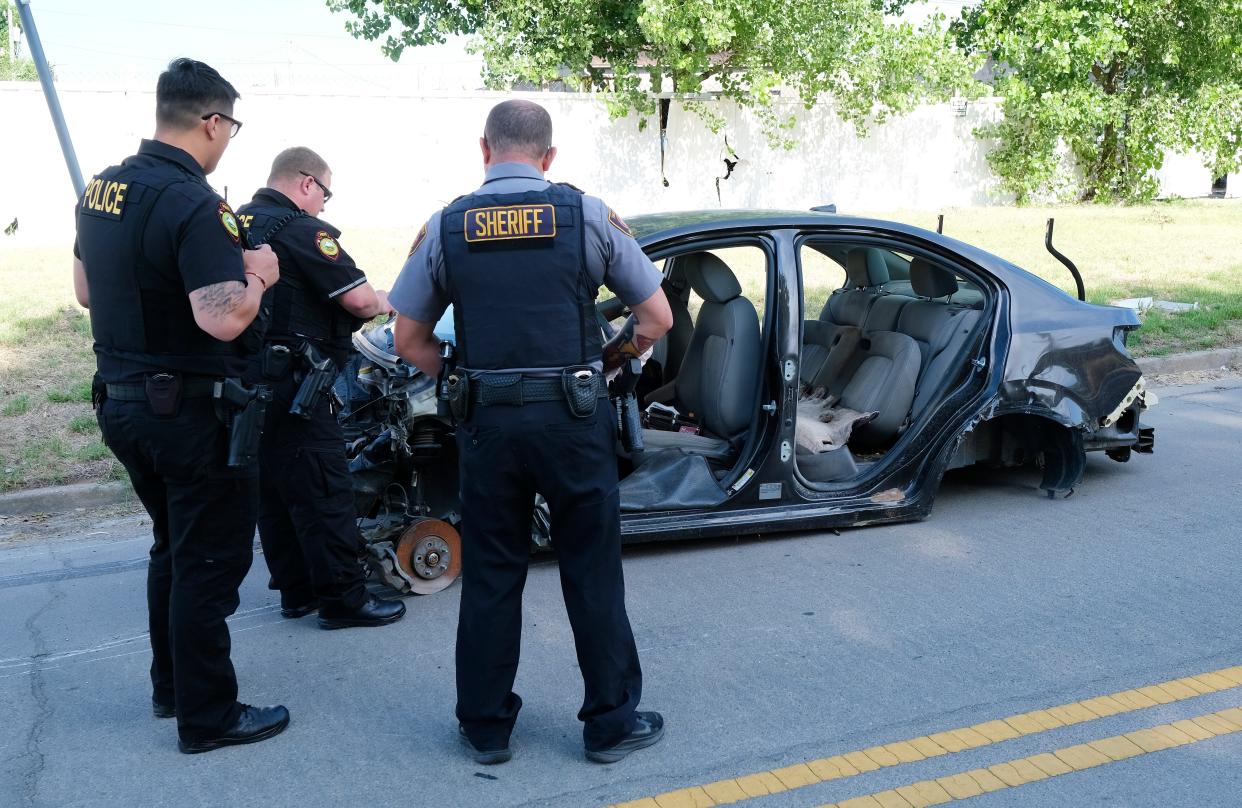Oklahoma agency pulls authority from tribal police in a move drawing safety concerns

- Oops!Something went wrong.Please try again later.
An Oklahoma state law enforcement agency says it will no longer allow tribal police officers to act on its behalf, a move that comes weeks after a dispute over jurisdiction in Okmulgee County.
The Grand River Dam Authority notified the Muscogee and Cherokee nations about the decision Friday, saying it would take immediate effect. The tribes’ leaders quickly denounced the move as a political stunt by Gov. Kevin Stitt, who has formed his own task force to analyze public safety issues on tribal reservations.
“We believe it is misguided to suspend any commission immediately,” said David Hill, the principal chief of the Muscogee Nation, based in Okmulgee. “Violent criminals and those who harm others will not suspend their criminal activities, and there should be more police on the streets to address them, not less.”
When asked if Stitt directed the Grand River Dam Authority to suspend its agreements with the tribes, a spokesperson did not say.
However, both the agency and the governor’s office cited the need for uniform police agreements between the state and tribes, which Stitt called for in his Dec. 22 executive order forming the One Oklahoma Task Force.
“The governor has asked for consistency from all state law enforcement as we continue to evaluate the impacts of the conflict in Okmulgee County last month,” Abegail Cave, the governor’s communications director, said in a statement. “The GRDA is working to ensure its agreements work to protect all Oklahomans in their jurisdiction.”
The development is the latest in a years-long dispute between Stitt and tribal leaders over the growing recognition of tribal reservations in eastern Oklahoma. Federal law limits the state’s power over tribal citizens on the reservations, which Stitt has frequently criticized as unsafe and unfair.
But tribal officials say they have expanded their justice systems to handle the increased caseload. They also point to dozens of operating agreements with other law enforcement agencies that allow police officers to enforce state and tribal public safety laws — which are very similar — at the same time. Then, if the person facing charges is Native American, the case is forwarded to tribal or federal court.
McGirt v. Oklahoma, 3 years later: How police work on the Muscogee Nation reservation
Suspending those working agreements makes people less safe, said Chuck Hoskin Jr., the principal chief of the Cherokee Nation, based in Tahlequah. He said the Grand River Dam Authority’s decision was not driven by reason, but apparent pressure from Stitt.
“Governor Stitt has spent more than three years pressing phony claims of chaos on tribal reservations with no basis, in fact, deciding to create chaos to fit his narrative,” Hoskin said.
The governor has pointed to a dispute in Okmulgee County between Muscogee Nation Lighthorse Police and county jail staffers, which escalated into a physical altercation.
The incident unfolded Dec. 18 after Lighthorse officers arrested a non-Native man accused of driving the wrong way in a school zone and possessing fentanyl. Tribal police had the power to make the arrest under the Muscogee Nation’s operating agreement with the Grand River Dam Authority.
When officers tried to drop the man off at the county jail, workers there refused to book him into custody, leading to a dispute. Tribal prosecutors later filed charges against a jail employee for allegedly assaulting a Lighthorse police officer during the encounter. The man’s initial court hearing in Muscogee Nation District Court is set for later in January.
Geri Wisner, the Muscogee Nation’s attorney general, met with officials from the Grand River Dam Authority in the days after the incident, Hill said.
“They expressed enthusiastic support for the benefits of working together under our cross-deputization agreement,” he said. “They even began planning training events to make others aware of how well it worked.”
The decision weeks later to revoke tribal officers’ authority came by surprise.
Brian Edwards, chief of law enforcement for the Grand River Dam Authority, said in a letter to the Cherokee Nation that their working agreement was not being terminated altogether, but was being reevaluated in light of the governor’s new task force.
Stitt has said the Okmulgee County conflict motivated him to create the task force, which he named after an online campaign he launched in July to promote his belief that state laws should trump tribal laws on tribal reservations.
The 13-member task force will include two representatives from tribal nations, a number Hill and Hoskin have both criticized as too low. Hoskin has said the Cherokee Nation will not have any involvement in the group.
Stitt has given the task force until June 1 to deliver a report recommending legal fixes and policy changes that would clear up confusion over jurisdiction on reservations.
Molly Young covers Indigenous affairs. Reach her at mollyyoung@gannett.com or 405-347-3534.
This article originally appeared on Oklahoman: Grand River Dam Authority suspends agreements with tribal police

